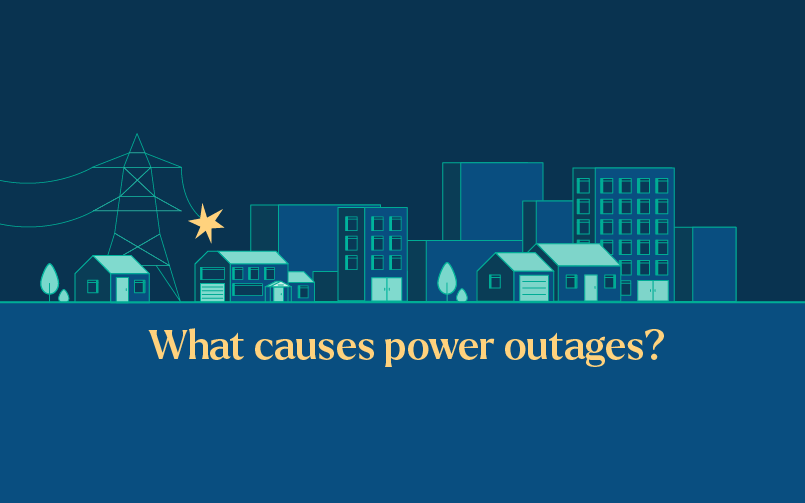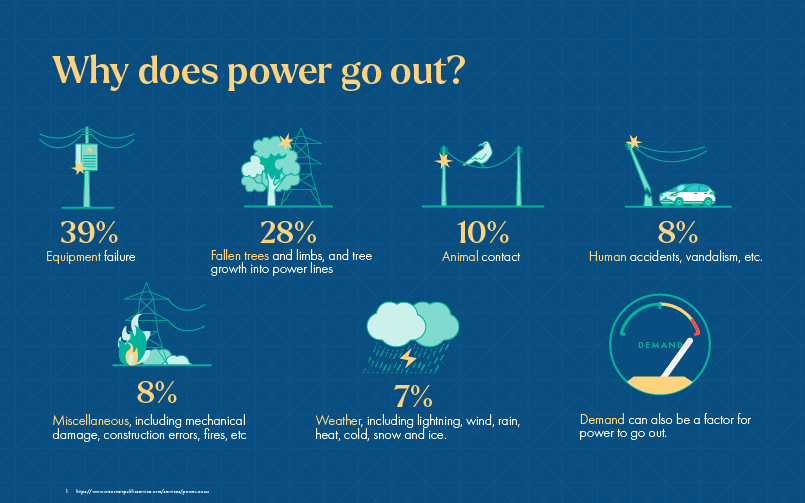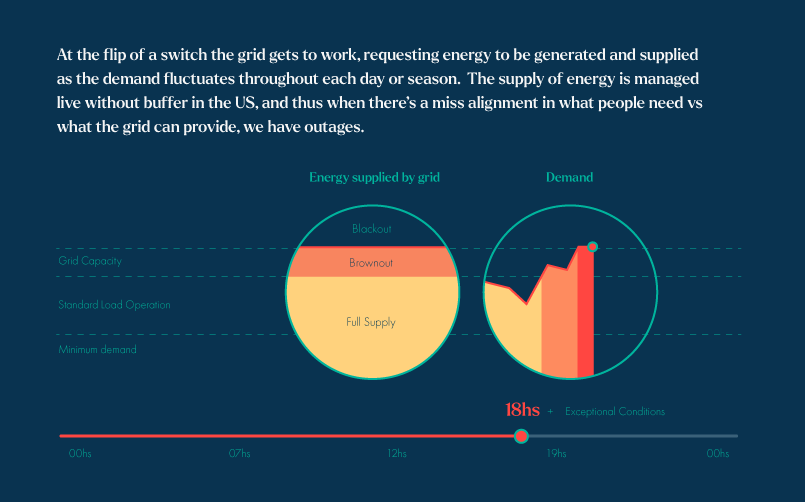What Electricity Company Services My Address
4 minute readFigure out what electricity companies service your home
Home > Learning Center > How the Energy Industry Works > What Causes Power Outages?
5 minute read • Last update April 2025

Most of us have experienced a situation where we’ve been going about our daily lives, and suddenly the power went out for no reason. Sometimes, power outages cause only a few seconds to a few minutes of disruption. Yet, in other circumstances, you may be left without power for hours — or in worst cases, even days.
Ever wondered what causes power outages and what you should do if you experience a blackout? Here’s everything you need to know.
Let’s take a more in-depth look at what causes power outages, considering a range of human, environmental, and mechanical failures.
Many homes experience “flickers,” where power is lost for an instant. Has this ever happened to you, leaving you wondering, “why did my power go out and come back on?” The most likely causes are internal. So, if you experience flickers regularly, it’s a good idea to have a trained electrician check your home for:
Heatwaves, thunderstorms, hurricanes, and winter storms are some of America’s leading power outage causes. For example, during the Texas winter storm of 2021, temperatures plummeted. The electric grid operator lost control of the power supply, leaving millions without electricity.
Earthquakes, wildfires, and mudslides can cause significant damage to distribution towers and substations, resulting in long-lasting blackouts. As global temperatures continue to rise and adverse weather becomes more common, wildfires and flooding will remain common causes of power outages.
When maintenance workers disrupt cables with ladders or other equipment, power outages can occur. However, human error can also involve members of the public. Examples include power line disruption following vehicle collisions with power poles and when balloons from parties become lodged in overhead wires.
Old and aging equipment can push power plants to the uppermost limit of their operating capacity, leading to blackouts when the system becomes overloaded. For this reason, many power suppliers plan power outages during bouts of extreme heat or cold to ensure facilities can cope.
Power suppliers protect electricity supplies by placing barriers around electric towers, cables, and utility poles. However, small creatures like squirrels, birds, snakes, and raccoons may still breach defenses. Squirrels are particularly problematic and are estimated to cause up to 30% of power outages.
Sometimes, the answer to what causes power outages is the power company itself. Planned blackouts or also knows as “rolling blackouts“, conduct routine maintenance or upgrades that are usually scheduled in advance. However, it’s also possible that companies may shut down operations to protect resources and reduce the chance of fire or equipment damage in periods of extreme weather.
Fallen trees and broken branches obstructing power lines are common causes of power outages. However, it’s not just mother nature that can uproot trees, which is why any felling or trimming should always be conducted by a professional.
Historically, most of Texas’s electricity supply has come from overhead sources. However, some areas have started to explore underground distribution methods. The cables sit just a few inches below the surface and are easily disrupted. That’s why Texas homeowners are required to contact 811 for approval before doing any digging.

Extreme weather conditions provide the most prominent reasons for power outages across the US. But, what about Texas specifically? Data shows that Texas ranks 2nd in the country for power outages, and more Texans have been more affected by blackouts over the past 20 years than residents in any other state. So, why does the power go out more often here than elsewhere? Here is a comprehensive breakdown of what causes power outages in Texas.

To understand the reasons for power outages, we must first learn more about how electricity is produced and distributed. There are three broad stages in generating electricity and distributing it to consumers. The underlying causes of power outages can derive from issues at any stage:
Power plants generate electricity by converting one form of energy into electrical energy. At BKV, we generate power by combining natural gas with a stream of air, which combusts and expands through a turbine to make electricity.
Because excess energy is expensive and difficult to store, electricity grids run at nearly a 1:1 ratio of demand to production, which means that only as much energy is produced as is being demanded by consumers at any given moment, and power plants are constantly adjusting their outputs to match.
Natural gas is an increasingly popular source of electricity production because it burns cleaner than coal and oil, and production is easy to quickly ramp up or down in alignment with real-time grid demand needs, unlike other sources.
Electricity is passed through step-up transformers before traveling long distances via high-voltage transmission lines — the large towers and pylons you see dotted across the natural landscape.
Electricity is passed through step-down transformers to convert it to a lower voltage so it can enter the distribution network, traveling along lines between utility poles and into customers’ homes.
No matter what causes electrical blackouts, the actions you take to avert and deal with power outages should be the same:
Graham Lumley, Digital Marketing Manager at BKV Energy, leads digital and traditional marketing strategies, focusing on educating Texans about the state's deregulated energy market. With over 8 years of marketing experience, he creates content to help consumers understand and save on their energy bills, bringing a fresh and dynamic approach to the industry.

Figure out what electricity companies service your home

What is natural gas? As the world continues to seek cleaner and more sustainable energy sources, natural gas has emerged
Get $50 off your electric bill!
Use code BKVEJOINUS50
Enter your zip code to shop BKV Energy's affordable, fixed-rate Texas electricity plans. Use the promo code for $50 off your electric bill.